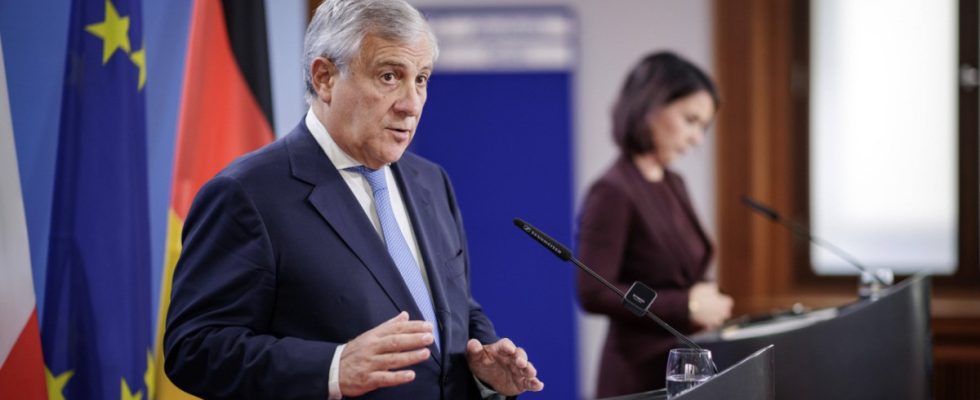Italian Foreign Minister Antonio Tajani was on a business trip to Berlin this week, and that didn’t improve his mood. Even in the press conference after the conversation with his official colleague Annalena Baerbock, he made no secret of his resentment. The Italian government sees the fact that Germany financially supports private organizations (NGOs) that look after migrants in Italy and on the sea off Italy as interference in domestic affairs and an unfriendly act by an ally.
Back in Rome, Tajani says he learned that there are now seven rescue ships on their way to the Italian island of Lampedusa, where a particularly large number of boats carrying people fleeing to Europe arrive due to its proximity to the North African coast. “That seems really strange to me. On the day that a possible EU pact is being negotiated, all these ships are coming,” said the Foreign Minister in an interview with the Roman newspaper La Republica. He was referring to the months-long negotiations in Brussels about an asylum reform that is intended to limit irregular migration.
The head of government complained to the Chancellor in a letter
So far, Germany in particular has come under pressure for its lack of approval for one element of the reform, but gave up its resistance on Thursday at a meeting of EU interior ministers. But then Italy suddenly stood in the way and expressed reservations, and Interior Minister Matteo Piantedosi left the meeting early. Here too, the stumbling block was apparently the role of the civilian sea rescuers.
The Foreign Office in Berlin announced a week ago on Friday that several NGOs in Italy would receive direct grants from Germany of between 400,000 and 800,000 euros each. This will implement an earlier decision by the Bundestag. Apparently because it was known that donations to SOS Humanity, for example, which runs a rescue ship in the Mediterranean, would be viewed critically, the Vatican-affiliated Catholic lay organization Sant’Egidio, which supports the socially disadvantaged and refugees, was also taken into account. Italy’s Prime Minister Giorgia Meloni was nevertheless surprised and formally complained in a letter to Chancellor Olaf Scholz.
10,000 boat migrants arrived on the Sicilian island of Lampedusa within a week.
(Photo: Cecilia Fabiano/LaPresse/AP)
Representatives of Matteo Salvini’s coalition partner Lega, who as transport minister is no longer directly responsible for the issue as before, immediately armed themselves verbally. There was talk of an “invasion,” and even references were made to the German occupation of Italy 80 years ago. Tajani and Meloni, in turn, are clearly trying to maintain a moderate tone and promote European coordination in solving the escalating migration problem. The two of them probably also know that pointing the finger at private rescue ships is not effective. According to several studies, it can be assumed that 90 to 95 percent of those coming to Italy were not picked up by these rescue ships, but by the Italian state coast guard and the Guardia di Finanza.
The government is once again tightening the rules for refugees
The three ruling right-wing parties had announced tough measures during the election campaign to reduce the number of boat migrants arriving in Italy. But they are not successful. In fact, more than 130,000 boat refugees have been registered since the beginning of the year, twice as many as in the same period in 2022. More than 10,000 people arrived in Lampedusa alone this month.
This week, the government once again decided on stricter regulations for refugees. On the one hand, the protection of minors will be reduced, but on the other hand, deportations should be able to take place more quickly. From now on, minors older than 16 can be accommodated in reception centers for adults. According to the new regulations, if it turns out after checks that someone gave false information about their age upon arrival in Italy in order to pretend to be a minor, immediate deportation could result. Non-EU citizens who have been living in Italy for a long time should be able to be deported more quickly, even for crimes that do not result in a prison sentence.
Meanwhile, the United Nations children’s fund, Unicef, published new figures on Friday. According to this, significantly more unaccompanied children and young people used the escape route across the Mediterranean this summer than in the previous year. With more than 11,600 between January and September, their number has increased by around 60 percent compared to 2022. Between June and August, 990 people died or went missing while crossing the Central Mediterranean, including children. This number has almost tripled compared to the previous year, although the actual number of victims could be significantly higher as not all ship accidents are recorded.
Unaccompanied children and young people in particular, especially girls from sub-Saharan Africa, are exposed to dangers such as abuse and exploitation during their flight, emphasized Unicef. “The Mediterranean has become a graveyard for children and their future. The devastating consequences for children seeking asylum and safety in Europe are the result of political decisions and a dysfunctional migration system,” said UNICEF Regional Director for Europe and Central Asia, Regina De Dominicis. She called for a Europe-wide solution to support children and families as well as more international help to combat crises in the countries of origin.

